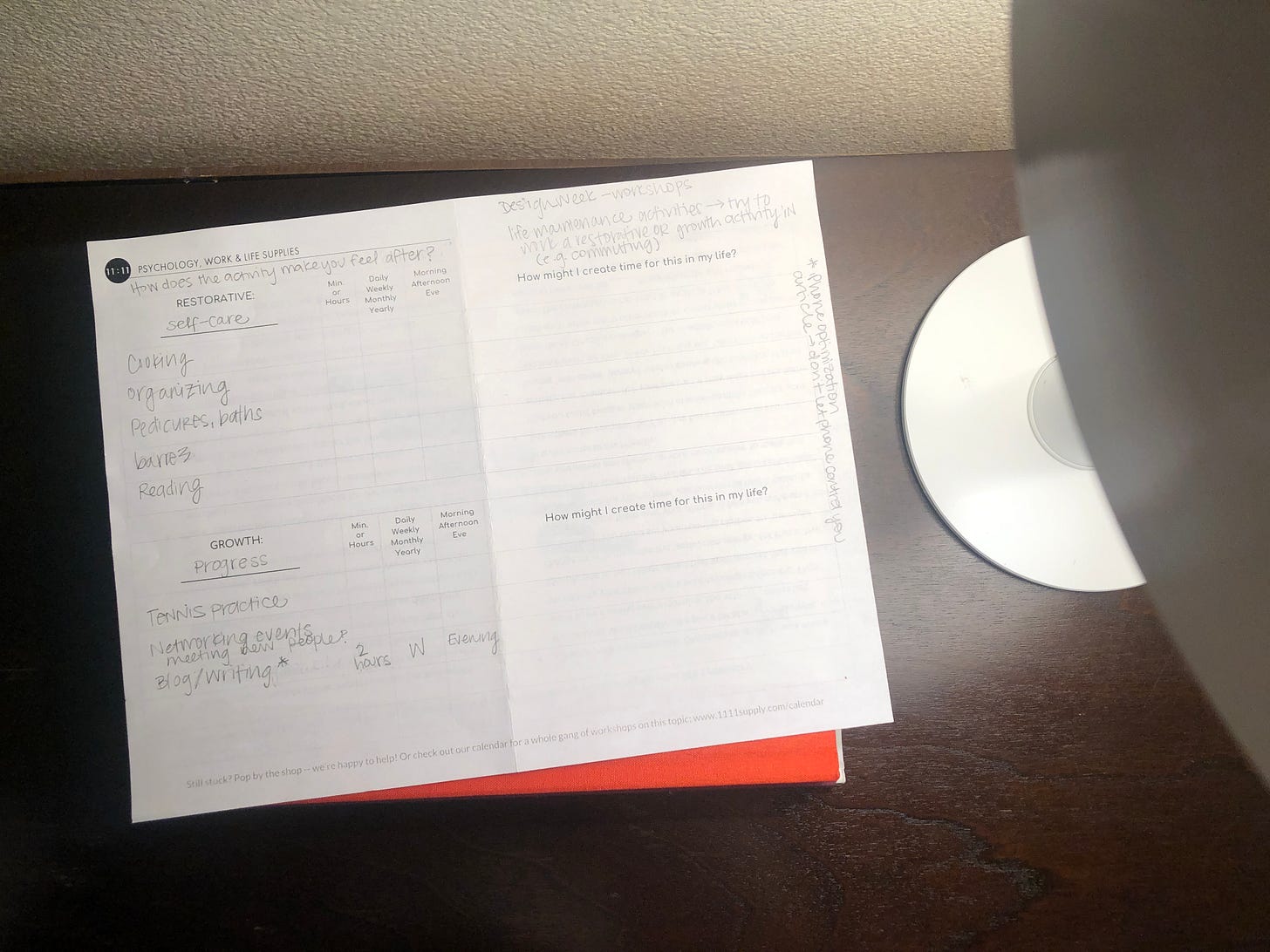Weekends Need a Break, Too!
Changing how I think about free time thanks to this simple framework


Last Sunday I woke up more relaxed than I usually do on Sunday mornings. There’s typically an assault of racing thoughts and to-do lists that immediately flood my brain as I start to wake on a weekend morning.
While those thoughts still floated to the surface of my conscious mind on this particular Sunday, I noticed that they weren’t as urgent. I felt like I had more time.
Why did this Sunday feel more expansive than others?
It was because I didn't have to go into the office the next day; I got to work from home.
Some quick background context—when I started working for Nike two years ago, we were on what we call a 3:2 hybrid schedule, meaning 3 days in the office (Tuesday-Thursday) and 2 (Mondays and Fridays) at home. At the start of this year we switched to a 4:1 schedule, necessitating Monday-Thursday in the office and Fridays at home. Even though it’s been nearly four months now, I hadn’t realized just how much I was still struggling with the adjustment until this past week.
Having the weight of work week prep lifted off me that day, I felt as if I could live my whole Sunday on my terms, as a true weekend day. Grocery shopping can wait until tomorrow, I thought to myself, relieved to not have the task of needing to figure out the week’s meals that day.
This got me thinking about how much pressure I’ve unintentionally put on weekends over the years, regardless of where I’ll be come Monday. I suspect I’m not alone in this feeling, especially if you work a 9-to-5 office job like me.
Weekends are sacred. I expect them to be everything, much like how our modern society treats romantic partners. I put them on a high pedestal, demanding they give me progress on the never-ending to do list, exercise, socialization or quality time with loved ones, fun, alone time, and rest and relaxation.
It’s no wonder I often wake up on weekend mornings, particularly on days when I don’t have many plans, that my anxious brain is riddled with possibilities. What do I want to do today? What can I accomplish today?
Thinking about how I structure my weekend time brought to mind this talk I attended back in 2019, where Paloma Medina, a performance coach and then-owner of a Portland productivity supplies store, discussed the concept of work-life balance.
While I didn’t remember it as “work-life balance,” per se, what stayed with me was the concept of our energy and how the different types of activities we partake in either drain us or fill us up. Some the energy drain is inevitable—we’ve got to grocery shop, do the laundry, take care of our kids, do our day jobs, etc. But in our free time that is ours for the taking (looking at you, weekends!), how do we fill it with things that ultimately restore our energy?
The key is that these things needn't all be relaxing in nature. It’s healthy to have a mixture of growth- or progress-based activities and restorative activities, Paloma explained. In an effort to think about what this looks like for ourselves, she gave us all worksheets to fill out, a piece of paper that I held onto all these years.1 Essentially the worksheet walks you through identifying activities in the growth and restorative buckets, identifying how much time you want of each, and then scheduling that into your weekly routine.

Over the past several years I’ve worked on bringing a balance of rest and productivity into my weekends. But that’s just it—I looked at it is productivity, not growth or progress.
And there’s a critical difference there.
I believe it was on this episode of pop culture commentator Kate Kennedy’s podcast, where she mentions cyclical activities as they relate to rest in her conversation with author Elise Loehnen.2
Things like laundry, grocery shopping, meal planning, cleaning—by being cyclical in nature, they will never be done. So when she realized this, Kate stopped treating them as items to check off her to do list and accepted that those things just exist.
In connecting this with Paloma’s framework, this is a powerful, incredibly freeing thought. Cyclical items simply don't fill the progress bucket. This is why something like organizing our shed or baking a cake for my friend’s birthday feels rewarding, while doing the dishes or folding the laundry does not.
While all four of these activities are productive, only the former two bring about growth or progress. This can be growth in the sense of teaching yourself a new skill (making meringue) or honing an existing one (baking cakes). It can also be growth in the sense of progressing on a project (hanging bike hooks and installing shelving as step one of the shed organization).
Writing this Substack is a new thing I’ve introduced into my weekend repertoire that falls squarely into the growth camp. It’s an activity that feels incredibly rewarding (even if I struggle with it at times) and is a skill I am actively building. I’ve tried really hard to avoid thinking of it as a “to do” because it is a hobby, i.e. something that I want to do, and I fear that putting it into the “to do” camp will cause me undue stress.
But the thing is, by saving my writing for the weekend (usually Sundays, my publishing day), I am causing myself stress. It puts unnecessary pressure on my writing, sometimes making it feel more forced, or like I’m not able to fully explore an idea.
It’s not the framing of the activity that is pressure-inducing, but rather the time I allocate for it. I know it’d be easier if I spent some time writing during the work week, but I have struggled with that in execution. I’m often tired getting home from my commute and start thinking right away about dinner. By the time that’s done I just want to relax, writing be damned. But something I haven’t tried yet is scheduling it in my calendar and honoring that like I would any other appointment.
So in the spirit of Paloma’s exercise and entering into a new week, I scheduled a writing session for myself this Wednesday evening.
It’s time to stop treating weekends as a catch all and relieve them of some pressure too, don't you think?
Is it ridiculous that I kept this incomplete worksheet and didn’t touch it for over five years, yet I knew exactly where to find it? Maybe. 🤪 But I think, in hindsight, that I held onto it because the concept resonated with me so much; preserving it wasn’t so much about the paper itself as it was the concept I wanted to embody or practice. It might’ve taken five years but as they say, better late than never!





I liked that book (7 deadly sins) and her podcast. I too feel a pressure to get everything in during the weekends and I work from home!